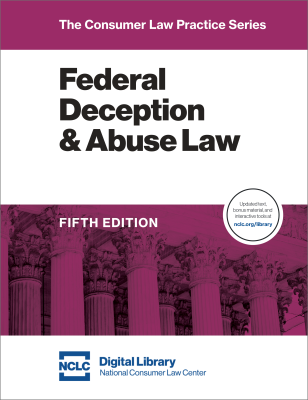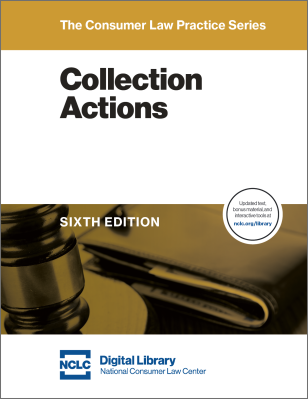Statutory attorney fees and the FTC Holder Notice are both critical tools in making consumer litigation practical. Consequently, the ability to obtain attorney fees when using the FTC Holder Notice to bring seller-related claims and defenses against creditors is of the upmost importance.
This article examines new and old ways for maximizing attorney fee recoveries despite language in the FTC Holder Notice that some courts use to limit those fees. The article then debunks five prevalent myths about the FTC Holder Notice that also can derail a consumer’s case unless the consumer litigant responds to them properly.
Attorney Fees Under the FTC Holder Notice
Whenever a seller assigns a credit sales agreement or refers the consumer to a creditor to borrow funds to purchase goods or services from the seller, the FTC Holder Notice must be placed in the credit agreement. The notice allows consumers to bring all of their seller-related affirmative claims and defenses not only against the seller, but also against the creditor presently holding the credit agreement. The consumer’s recovery can reduce the amount still owed to the holder, and when the consumer’s damages exceed the amount still owed, the consumer can recover affirmatively, up to a cap. The cap is the amount the consumer has already paid on the loan; in the case of a credit sale, the amount already paid includes down payments and trade-ins. A detailed description of the FTC Holder Rule (Preservation of Consumers’ Claims and Defenses Rule) is found at NCLC’s Federal Deception Law Chapter 4.
A critical issue in determining the viability of consumer litigation occurs when the consumer’s damages exceed or come close to the cap. In that situation, can the consumer also recover the full amount of statutory attorney fees to which the consumer is entitled, or does the cap limit that recovery? For example, consider a case of a consumer who has paid $8000 to a creditor and still owes $4000 on the note. The cap under the FTC Holder Rule is therefore $12,000. If the consumer is held to be entitled to $10,000 in damages, does that mean that attorney fees are limited to $2000 so that the total recovery stays within the cap? Courts are divided on this issue, some indicating that the fees are subject to the cap and others finding they are not. See NCLC’s Federal Deception Law § 4.3.5.
Courts finding the fee recovery not subject to the cap take into consideration that it is the holder’s litigation conduct in not settling the case that creates the need for a fee award, and not the consumer’s seller-related claims. Statutory fees are intended to encourage settlement, to make it possible for consumers to bring small claims, and to discourage companies from using their superior resources to wear down the consumer. All these goals would be frustrated if attorney fees were subject to a cap.
Nevertheless, courts presently are divided on the question. This article examines old and new ways to still recover attorney fees even where a court rules such fees are subject to the cap.
Cap Applies Only to “Recovery Hereunder”
The FTC Holder Rule’s cap applies only to “recovery hereunder.” See 16 C.F.R. § 433.2. In other words, the holder is liable for seller-related claims recovered under the FTC Holder Notice up to the cap. But the cap does not apply to the consumer’s claims against the holder based on the holder’s own conduct, such as violations involving debt collection, loan servicing, or repossession practices. Such recoveries are not “recovery hereunder” because they are not recovery under the FTC Holder Notice. A consumer’s recovery against the holder for its own misconduct should simply be added to the amount allowed under the FTC Holder Notice. This also means that any attorney fees recovered for work on claims involving the holder’s own misconduct are also not subject to the cap.
In addition, some statutes provide that where the seller has violated the law, the assignee is also subject to damages and attorney fees for the seller’s violation. A good example is the Truth in Lending Act, which creates assignee liability except when a disclosure violation is not apparent on the face of the disclosure. Since recovery is not under the FTC Holder Notice, the attorney fee recovery is not capped.
“Recovery hereunder” has a second important implication. If the consumer’s attorney fee claim is pursuant to a fee-shifting statute that forms the basis for the consumer’s claim against the seller, courts are divided as to whether the attorney fee recovery is subject to the cap.
But there are often grounds for a consumer to recover attorney fees other than pursuant to the statute underlying consumer’s claim against the seller. Recovery under these other bases are not “recoveries hereunder,” because they are not based on the consumer’s claim against the seller. They are provided by other state laws and apply to the losing party in a litigation, and not to the seller. For example:
- Ten states—California, Connecticut, Florida, Hawaii, Montana, New Hampshire, New York, Oregon, Utah, and Washington—have enacted statutes that provide for reciprocal attorney fees. If a credit agreement provides attorney fees for a prevailing creditor, then, under a reciprocal fee statute, a prevailing consumer has the right to recover fees. These provisions apply as much to assignees as to the originating creditor. See NCLC’s Collection Actions § 17.1.3.
- Sixteen states provide for an attorney fee recovery for a prevailing consumer under certain circumstances, but not tied to any particular statutory claim. See NCLC’s Collection Actions § 17.1.4.
- Attorney fees can be recovered where the holder has denied facts presented to it in a request for admissions and the consumer proves those facts. See NCLC’s Collection Actions § 17.1.7.
- In almost every state, a holder’s litigation misconduct can result in attorney fees for the consumer. A listing of state standards is found in NCLC’s Collection Actions § 17.1.8.4.
New Laws in California and New York Allow Full Attorney Fee Recoveries; Other State Statutes
California Assembly Bill 1821, signed into law on July 12, 2019, adds Cal. Civ. Code § 1459.5, effective January 1, 2020. The new law provides that in a claim pursuant to the FTC Holder Notice, a successful consumer can recover attorney fees, costs, and expenses to the fullest extent as if the claim was brought against the seller. The consumer’s attorney fee recovery thus is not limited by the cap. Since this California statute is independent of the statute underlying the consumer’s seller-related claims, the attorney fee recovery is not “hereunder.” Instead, it is similar to a recovery under a reciprocal fee statute or a state statute providing for fees for any prevailing consumer. This is not a case of a state statute interpreting a federal rule, but a state statute providing for recovery that is not circumscribed by the FTC Holder Notice’s cap.
A New York statute reaches the same result with a different approach. N.Y. Pers. Prop. Law § 302(9)(a), effective January 1, 2018, applies to motor vehicle and other retail installment sales. The statute provides that assignees are subject to the consumer’s seller-related claims and defenses up to a cap. Then section 302(9)(b) explicitly provides that the cap is exclusive of any costs and attorney fees the court may award. This state statute also is not interpreting whether attorney fees are available pursuant to the FTC Holder Notice. It provides the same relief as the FTC Holder Notice, but does so pursuant to state law. The state law then further explains the operation of the state law as not capping attorney fees.
This is a clear and straight-forward approach to avoiding the lack of clarity as to attorney fees found in the FTC Holder Notice. The New York protection is limited to credit sales, but there is no reason why other similar state legislation could not also apply to direct loans to the consumer from a lender related to the seller. A number of state statutes already provide that consumers can raise seller-related claims against assignees and related lenders. See NCLC’s Federal Deception Law § 4.5. These statutes could simply be amended to provide—like New York—that the cap is exclusive of any attorney fees the court may award.
Five Myths About the FTC Holder Notice Debunked
Myth #1: Consumers Have No Remedy if the FTC Holder Notice Was Not in the Credit Agreement.
It is true that the FTC Holder Rule requires the seller and not the holder to place the FTC Holder Notice in the credit agreement, and it is true that there is no direct private right of action under an FTC rule. But in almost every case the consumer has a strong remedy even where the notice improperly is not found in the documents.
In all fifty states, UCC Article 9 provides that the FTC Holder Notice shall be implied into the agreement for all credit sales assigned to another. See NCLC’s Federal Deception Law § 4.4.2.1. Where a related lender makes a direct loan, the same protection is offered by revised UCC Article 3, but this protection has only been enacted by ten states. NCLC’s Federal Deception Law § 4.4.2.2.
For direct loans in the other states, one approach is to look at state laws. Some states have statutes providing that related lenders are subject to a consumer’s claims and defenses whether or not the FTC Holder Notice is in the agreement. See NCLC’s Federal Deception Law § 4.5. In addition, state theories such as unfair and deceptive acts and practices (UDAP) or aiding and abetting or co-conspiracy may provide a valid claim where the lender knew the FTC Holder Notice should have been included in its note.
Myth #2: Positive Recoveries Under the FTC Holder Notice Are Available Only Where Consumers Can Rescind the Agreement or the Purchase Is Worthless.
A number of courts in the past took out of context statements from the FTC staff that an affirmative recovery under the FTC Holder Notice would likely only occur where the product was worthless or the consumer could rescind the transaction. These courts made it a legal requirement that a consumer could recover affirmatively only if the consumer could rescind the transaction of the purchase was worthless.
In the past this theory was like a zombie—no matter how many times the FTC issued statements rejecting this theory, some courts still adopted it. The FTC rejected the approach in a 1999 staff interpretation, the full Commission issued an advisory opinion rejecting the approach in 2012, and the full Commission in a 2019 review of the rule again rejected the approach. See Confirmation of Trade Regulation Rule Concerning Preservation of Consumers’ Claims and Defenses, 84 Fed. Reg. 18,711, 18,712 (May 2, 2019). Virtually all recent court decisions also reject the approach. Hopefully by now this limit on affirmative recoveries has been thoroughly and universally debunked. See NCLC’s Federal Deception Law § 4.3.4.3.
Myth #3: State Law Can Override the FTC Rule.
At least one court has ruled that where state law allows consumers to raise only seller-related defenses and not affirmative claims against an assignee, the state law should limit the FTC Holder Notice. It is absurd to hold that a federal rule enacted to overcome such restrictive state laws instead should be made a nullity by the operation of state law. If this interpretation were followed, the FTC rule would in fact be a deceptive nullity, because the notice states that consumers can raise all seller-related claims against the holder. See generally NCLC’s Federal Deception Law § 4.3.11.2.
The sole decision adopting this theory got confused because the FTC has stated that state law can determine which claims are available against the seller. The FTC never said that state law can determine when available state claims against the seller can be raised against a holder. Moreover, the FTC’s 2019 review of the Holder Rule explicitly affirmed that state law does not limit the Holder Rule. See Confirmation of Trade Regulation Rule Concerning Preservation of Consumers’ Claims and Defenses, 84 Fed. Reg. 18,711, 18,712 (May 2, 2019).
Myth #4: The FTC Holder Notice Does Not Apply to Warranty Claims.
The federal Magnuson-Moss Warranty Act states that, for purposes of civil liability under that Act, “only the warrantor actually making a written affirmation of fact, promise, or undertaking shall be deemed to have created a written warranty, and any rights arising thereunder may be enforced under this section only against such warrantor and no other person.” 15 U.S.C. § 2310(f). A question arises whether a claim under the Magnuson-Moss Warranty Act can be brought against an assignee of the warrantor, based on the FTC Holder Rule language, or whether the above-quoted language restricts a consumer’s ability to bring such a claim against anyone other than the warrantor.
Note the limits of the above-quoted language. That language states that “any rights arising thereunder” may only be enforced against the warrantor. The “rights arising thereunder” refers to rights with regard to a written warranty. The limits on liability thus apply only to claims relating to a written warranty.
A consumer is not prevented from using the FTC Holder Notice to claim a holder’s derivative liability when a Magnuson-Moss Warranty Act claim is not based on the enforcement of a written warranty. Moreover, the limitation only prohibits enforcement of the warranty “under this section,” i.e., section 2310 of the Magnuson-Moss Act, which creates a private cause of action under that Act. It does not restrict enforcement of written warranties pursuant to other laws.
Claims not affected by this provision include: any warranty claim under UCC Article 2 or other state law; Magnuson-Moss Act claims for breach of an implied warranty or a service contract; and claims for violation of various Magnuson-Moss Act disclosure requirements or substantive restrictions, such as those dealing with tie-ins.
Even for Magnuson-Moss Act claims based on written warranties courts are divided. The better argument is that the Magnuson-Moss language only provides that third parties have no direct liability under the Magnuson Moss Act for breaches of the warrantor’s written warranty. But a third party can have derivative liability if that party has agreed by contract (i.e., the FTC Holder Notice included in the contract) to be subject to claims the consumer can bring against the written warrantor. The claim is being pursued for the warrantor’s violation, not for the assignee’s violation. See generally NCLC’s Federal Deception Law § 4.3.8.3.
Myth #5: The Consumer Cannot Obtain Remedies Other Than Damages Under the FTC Holder Notice.
Consumers typically utilize the FTC Holder Notice language to seek damages from the holder, but a consumer’s remedies are not limited to damages. Consumers can seek all claims against the holder that a consumer could assert against the seller. In rejecting an industry comment that injunctive relief should not be available, the FTC has stated: “The Commission affirms that the plain language of the Rule does not limit the types of relief a court may award against a holder.” See Confirmation of Trade Regulation Rule Concerning Preservation of Consumers’ Claims and Defenses, 84 Fed. Reg. 18,711, 18,713 (May 2, 2019). Consumers should be able to seek an injunction, declaratory relief, rescission, or restitution where appropriate. The cap applies only to an action for affirmative monetary relief.



